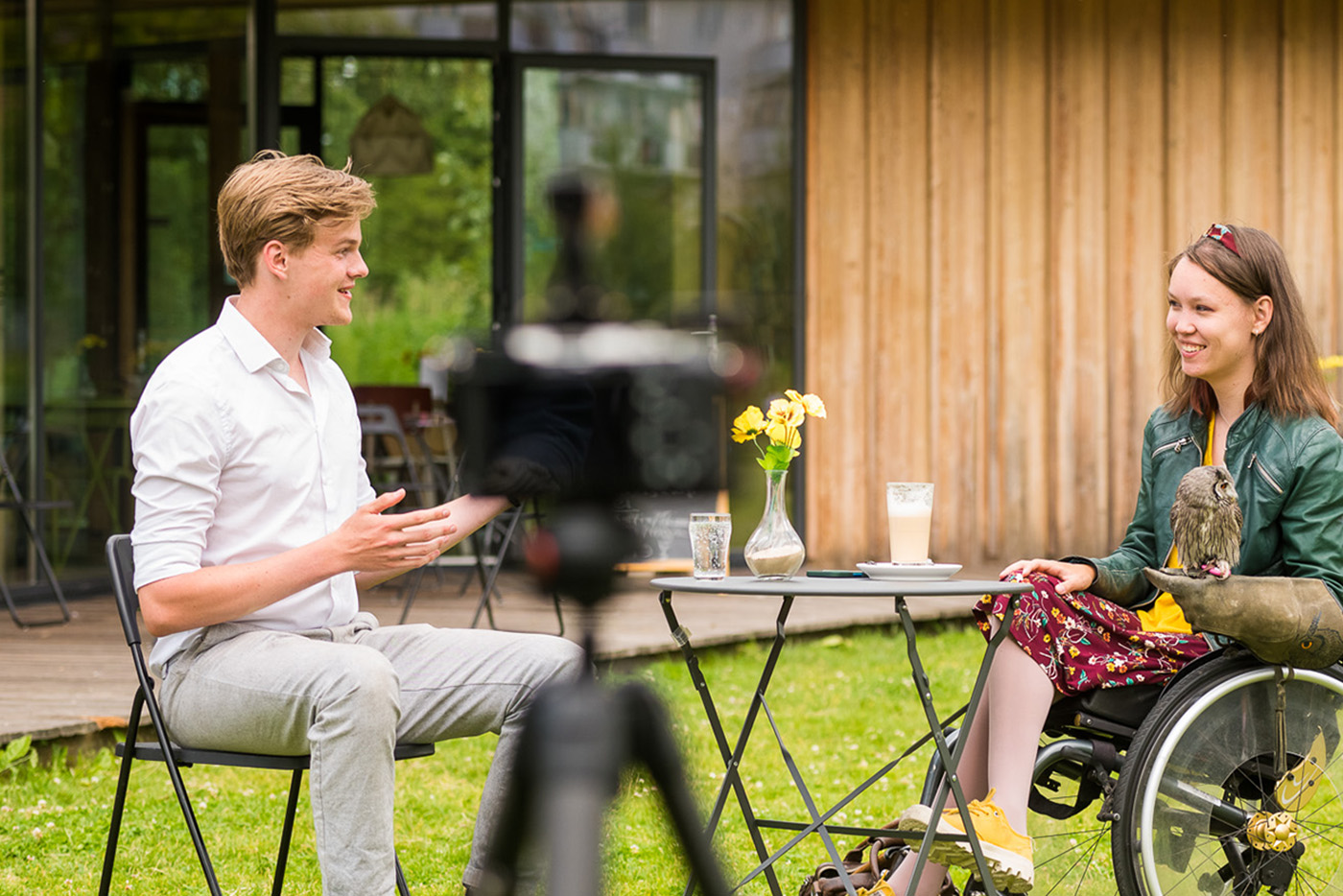Study and the labour market
If you are going to study, it is not only important that you like the study programme. It’s also good to already have an idea of which professions you might enjoy.
After all, your studies will prepare you for the labour market. After a few years of enjoying your studies, it is also nice if you can enjoy your subsequent jobs. Remember that you will work for quite a few years of your life! So also consider the job opportunities in study programmes that interest you.
Due to the selected cookie settings, we cannot show this video here.
Watch the video on the original website orWhat can I do with a certain degree on the labour market? Which skills are useful for a future job? How do I gain experience and already learn useful skills in and beyond my study programme? And how will Leiden University help me prepare for the labour market? You will find answers to all these questions below.
One question you may have when choosing a study programme is what you can do with it on the labour market. This is more obvious for some studies than for others. See what you can already discover about this. That can help you make your study choice. Look at relevant websites, ask your questions on open days, and talk to people in the professional field.
Exploring job opportunities
Your working life may seem far away and abstract when choosing your study programme. The questions below will help you get started. Among other things, talk to people with interesting jobs to get answers to the questions and a better idea of what you want.
- What jobs can you do with your study programme?
- Where do graduates end up?
- How easily do they find a job?
- What (professional) skills will you develop during your studies?
- What can you do to improve your job prospects?
Leiden University study programmes and the labour market
Before making a study choice, it is useful to have an idea of the work you can do after graduating from a study programme at Leiden University. That is why you can find information about the labour market for each study programme. Look for the study programme that fits your interests in the lists of bachelor’s and master’s degree programmes, and go to the ‘After graduation’ or ‘Career prospects’ section.
Also be sure to check out the Leiden University Career Zone to see where Leiden graduates have ended up.
Job prospects versus interests
Job prospects are important, but your motivation and interest in a study programme are at least as important. Being too focused on your job prospects can lead you to study something that is less appealing to you. That increases the chance that the study will disappoint and you will be less motivated to finish it. You also might end up working in a professional field that doesn’t really interest you.
You might also find that a study programme suits your interests but the job prospects are unfavourable. In that case, make sure you develop yourself as much as possible within and alongside your studies. Make smart choices that will increase your job prospects and can help you find that suitable job.
Definitely include job prospects in your considerations, but don’t let them be your sole motivation. Above all, choose a study that excites you.
Useful websites with information about the labour market
These websites offer practical information about professions and the labour market.
- Studiekeuze123.nl: information about the labour market, labour market forecasts, and most frequently chosen professions for graduates of HBO and WO study programmes
- Tkmst.nl: search by study programme or by sector for what professions entail
- Opleidingenwerk.nl: videos and interviews about all kinds of professions
- Youchooz.nl: professional orientation in the health care, wellness and sports sector
- Nationaleberoepengids.nl: read all about various professions
It’s useful to get an idea of the possible jobs that match your prospective study programme. You often discover during your studies that there are many more career options than you thought of before you started. But knowing what skills you have, how you want to develop them during your studies, and what is important to employers will also help you move forward.
Broad basic skills from higher education
You also see that graduates often end up in different places than you might expect. This is because (most) study programmes in higher education provide a solid foundation for various jobs. Practical professional and/or academic skills you learn in and alongside your studies can be put to good use in many jobs. These are known as employability skills and they include:
- Critical thinking / problem-solving skills
- Communication skills (written/oral/presenting)
- Collaboration
- Social and intercultural skills
- Leadership
- Professional attitude / work ethic
- Digital skills
But also:
- Empathic ability
- Adaptability / resilience
- Cultural awareness
These skills are at least as relevant to employers as job-specific or technical skills. The more of these skills you have, the more widely employable and therefore more interesting you will be to employers.
When applying for a job, you need to understand yourself and your competences to present yourself well. You also use these skills in daily life. All the more reason to develop them properly.
- Want to know more about employability skills? Check out the LU Career Zone!
Once you have chosen a study programme and will soon be a first-year student, you may not be actively engaged in your career and preparation for the labour market right away. You don’t necessarily need to be, either. However, it’s helpful to realise that as you go through your study programme, you are consciously or unconsciously creating your (study) career.
If, from the first year of your bachelor’s degree programme, you are (more) aware of the choices you make in and outside your curriculum, you will have opportunities to gain experiences that develop your skills (also for your future career). You can think of this period as an experimental phase. Sometimes simply trying something new is already very valuable because you can see what excites you about it (or not), whether it suits you or what you learned from it. This isn’t to say you should always know in advance exactly why you are making a particular choice. Trying something new can also provide opportunities to adjust your plans if necessary. The more often you practise (parts of) study career planning, the more confidence you will develop to make informed decisions. Among other things, it can help you in choosing a particular bachelor internship, further education and/or a career after university.
Know that it is never too late to start your study career planning. During your studies, you may sometimes feel that you started thinking about your study career too late. But the entry point can and may be different for every student. Whenever you start your (study) career planning, it will help you advance at every stage, during and after your studies.
Building a study career
Study career planning involves choices you make in your curriculum (elective courses/minors, internship, study abroad, honours programme) and beyond it as well.
Extracurricular activities like administrative duties, (relevant) part-time jobs and volunteer work or a study abroad can also give you skills and experiences that will help you develop further. To increase your job prospects, it is strongly recommended that you not only focus on studying but also on developing more broadly. Do it for yourself and to distinguish yourself from others when finding a job later.
Take a look at the (Study) Career Route planner to explore the opportunities available per academic year to further develop yourself during your study career.
Study career stress
By the way, we are not saying you have to do аll these activities to build a good CV. That is probably impossible and may cause unnecessary stress. Spread the activities over your years of study and choose those that you enjoy doing and that add something to your (study) career. You may be inspired by others around you to build certain experience. However, that can sometimes come with certain pressures. It’s fun to do activities together, of course, but don’t forget to focus on yourself too. See what is feasible for you and make your own plan!
Studying at Leiden University will prepare you for the labour market in many ways. The study programme itself devotes plenty of attention to this, but there are also many services and tools that can help you clarify your desires and possibilities and make sure you find a job that fits them.
Career Services
Leiden University’s Career Services advise students and recent graduates about the transition from study to first job. They also offer guidance on study choice and career questions related to the bachelor’s and master’s degree programmes. Each faculty has its own Career Services.
You can go there for:
- study choice advice (also about switching studies)
- career advice
- internship advice
- choice of master’s programme and career opportunities
- career tests
- information on career orientation and applying for jobs
- workshops
- CV and cover letter check
- informational meetings
Leiden University Career Zone
The Leiden University Career Zone is the ultimate website for Leiden University students and alumni who want support in their (study) careers. You will find advice, information, (career) tests and tools about (study) career planning, career opportunities with your study programme, labour market orientation, applying for jobs, the alumni Mentor Network, the job portal, workshops and events, and Career Services. It also includes:
- Career Planning module
If you already want to work more on career planning, take advantage of the Career Planning module. It will take you through the entire career orientation process using a number of steps. At each step, you’ll find explanations, information and corresponding assignments. - Job application tips
Information and tips about your CV, LinkedIn profile, cover letter, interview, assessments, networking, pitching, and terms of employment. - Labour market and fields of work
This information can also be useful for your orientation. Here you will find information about labour market developments, diversity and the labour market, internships, volunteering, working abroad, working with a disability, self-employment and more. - Job Portal and Events Portal
The Job Portal lists vacancies for part-time jobs, volunteer work, internships and entry-level jobs. The Events Portal shows the activities offered to students by external parties/organisations, such as in-house days, career events, master classes, orientation days, challenges, etc. - Alumni mentor network
Through Leiden University’s mentor network, students can connect with experienced alumni and easily approach them for career advice.
Workshops and events
In the course calendar, you will find an overview of career and job application workshops organised by Career Services.
Study associations
Study associations are a great way to find out about the future labour market. In fact, they regularly organise activities about the professional field related to your study programme. These can include career days, get-togethers, lectures and excursions to companies.
-

Jesper van Loon: 'In addition to my study Bio-Pharmaceutical Sciences, I work for my own company BLIJLES. The company originated from a hobby in high school. I help explain things like mathematics and chemistry. I really like doing business. The qualities I am now gaining - leading, collaborating, taking responsibility - I would like to take with me to a future job.' -

Thirza Terdu: 'I still benefit from my experience as a board member of my study association, in which I learned to meet, network and organise. For example, I developed an app to offer members their own platform. I then moved on with that practical experience. During my internship at WOMEN Inc. my resume jumped out because I made that app. So my first job has now been rolled out!' -

Joris Noordenbos: 'If it is up to me, I would like to become a presenter of the eight o'clock news one day. I really like presenting. Preparing it, reading the script, the whole atmosphere around it, the people you work with. I really like all of that. Within the media committee of the introduction week I have the opportunity to be creative and work with a camera and develop myself in making media items.' -

Nashanty Brunken: ‘Where I used to write short stories, poetry and my own guitar songs, now I write for two magazines: Leiden Science Magazine and Universum. The first is a new magazine of the Faculty of Science and the Universum is the magazine of the Youth Working Group on Astronomy. It's great to be able to combine my passion for writing with my study programme!' -

Youp Theunisz: 'My role as chairman of the introduction week committee is completely different from what I learn at my study programme. My programme is a lot of stamping and blocking in the library. Now I am also building a set of skills next to my studies. How I present myself in a group, how I work on a project, what it is like to work in a team. Those are things that I do find important and that will come in handy later on.'

